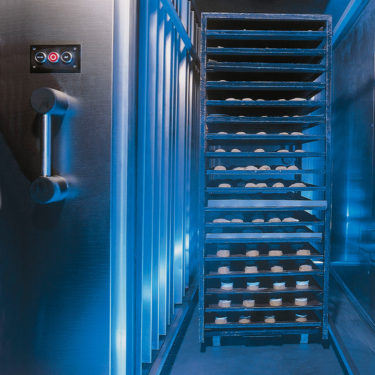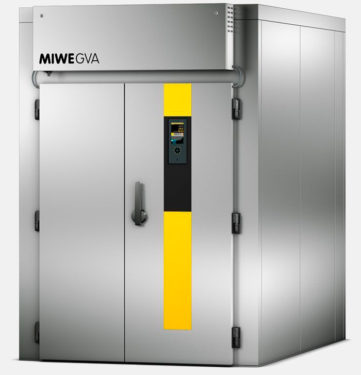“Provers and retarder provers offer something of a paradox in the bakery. You bake your dough to perfection in the oven but that much sought oven fresh taste actually comes from the proofing and retardation process.”
This point is made by Steve Merritt, managing director of EPP, the Epsom-based company whose stated mission is to enable bakery innovation. And buying the right retarder prover that most suits your needs is essential benefit for the baker seeking to drive their businesses forward.
He argues that the availability of baked goods fresh from the oven at any time of the day or night has as much do with proofing and retrarding the dough as it does with the oven and technology at the opposite end of the temperature scale.
“Take rolls, for example. They typically need around two hours until they have been prepared and ready to sell. Probably only 18 minutes of the 120 are spent in the oven. In addition to baking the proofing and storage of the dough plays a major role in determining their finished quality.”
Mr Merritt goes onto to points out that nowadays the space necessary for proofing and retarding can be up to three times as large as the baking area. “If you consider the storage capacity instead of the area, the matter becomes even clearer. One unit of baking can mean up to 50 units of proofing and retarding.”
It is has been well documented for many years how retarder provers help bakers plan production, prevent supply shortfalls and ensure that ovens are used to their full potential and capacity. Leading German bakery equipment manufacturer MIWE makes proofing and retarding units that more than meet the requirements of today’s bakers.
 EPP offers MIWE dough retarding and proofing systems to cope with the production requirements of a few trays right up to well over 200 racks. The largest MIWE prover EPP has so far installed in the UK and Ireland – with a capacity of 230 racks – is at a leading independently owned Scottish bakery.
EPP offers MIWE dough retarding and proofing systems to cope with the production requirements of a few trays right up to well over 200 racks. The largest MIWE prover EPP has so far installed in the UK and Ireland – with a capacity of 230 racks – is at a leading independently owned Scottish bakery.
Refrigeration planning in bakeries very often needs individual solutions and to meet this demand MIWE has a programme of various components for each and every temperature range required by
bakers.
Although proofing is not complicated it is fundamental to the quality of the baked product. It involves controlling three basic factors: temperature; humidity and time. Get any of these wrong and an inferior product is the result. Not enough humidity and the product will not rise properly, too much and excess moisture condensing on the dough could result in a tough crust and surface blisters.
MIWE’s GVA fully automatic unit is a sophisticated yet extremely versatile fully automatic retarding and proofing device thanks to being able to offer proofing, proofing retardation, rapid cooling, proofing interruption and dough setting options. It can operate at temperatures between a frigid minus 20C and 45C and humidity levels between 60% and 98%.
The MIWE GUV has the same technical characteristics as the MIWE GVA but its operating range is minus 25C to 15C. Therefore it is normally used as a defrosting cell.
Mr Merritt adds that the “precise control of the whole process offered by MIWE‘s range of provers and retarder provers simplifies and ensures the consistent quality of the modern baker’s preparation systems. A wide selection of control options from single button operation for unskilled workers to sophisticated monitoring and data recording systems are available.


1 Comments
Leave a Comment
raul
Price for a retarding cabinet which works between 5 to 40 . Please.